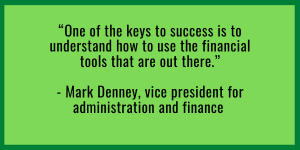
UHCL aims to strengthen students’ knowledge with new financial literacy course
The National Financial Educators Council (NFEC) reports on its website that out of 17,000 participants, 48% were able to pass a 30-question test covering topics including budgeting, paying bills, setting financial goals and other personal finance-related topics.
A survey conducted by the NFEC reported 5.2% of millennials were turned down from a job because of a lack of financial knowledge.
Ramsey Solutions Research surveyed over 76,000 students who completed a personal finance class and found those who had taken the class understood key financial topics including: the difference between credit cards and debit cards, how to pay income taxes, how home, auto and life insurance work, how student loans work, and what a 401(k) is and how it works.
College financial literacy programs create multi-generational conversations, provide life skills, and financial planning for college students enables financial independence.
“It is important to help empower our students who need to understand finances, not only understanding loans and financing college, but to set students up for success,” said Steven Berberich, senior vice president for academic affairs and provost at UHCL.
UHCL administrators and College of Business (COB) faculty developed an eight-week financial literacy course for first-year and new transfer undergraduate students. Students can enroll into the course starting Spring 2021.
“The Financial Literacy Course is designed to prepare all students for a lifetime of making wiser and well-informed financial decisions,” UHCL President Ira. K. Blake said. “Knowing how to access financial markets and leverage financial services is critically important for achieving personal and professional goals. I am confident students will find great value in completing this course.”
The administration’s goal through the course is to strengthen the foundation for personal and professional success by empowering students with financial knowledge, both for navigating the cost of college and for future financial decisions.
“What we are trying to accomplish as a higher education institution is to not only give our students a degree in engineering, psychology or English, but to give them a pathway to a career and a better life,” said Mark Denney, vice president for administration and finance. “One of the keys to success is to understand how to use the financial tools that are out there.”

To fully understand the importance of financial literacy Aaron Hart, vice president for student affairs said to look at the history.
“I want them to understand the historical concepts and contexts of wealth and how wealth is gained and distributed based on your socioeconomic group and your race and ethnicity,” Hart said.
UHCL announced the creation of the financial literacy initiative after the murder of George Floyd.
“Literacy is education, and that is why we need to understand the historical racism and the historical wealth gap barriers that we have had since the inception of this country as it relates to people of color or people from underrepresented groups,” Hart said.
The course consists of six components: financial planning by setting realistic and meaningful goals and career objectives; budgeting and saving; successfully managing credit and major purchases; paying for college and effectively managing debt; investing and retirement planning, and navigating financial decisions; advocating for financial equity.
“We will continue to evolve the financial literacy course to keep it current, and we will look to see how we grow in supporting students,” Berberich said.
To encourage first-year and new transfer undergraduates to complete the course and show the university’s commitment to building a foundation of financial literacy, students will receive a $500 scholarship toward tuition for the following semester. Eligible students will receive an email offering enrollment to the course.
“I think this class is one of the most directly applicable topics to everyone’s life,” said Stephen Cotten, associate professor of economics. “We all deal with financial issues, and they are confusing in some part to everyone. In my other classes, I know some people will use everything, but a lot of people will only use a few things, if any. But this class, everyone can use nearly everything.”
If a student does not qualify as a first-year or new transfer undergraduate, they can take a free comprehensive financial literacy course by creating an account on cashcourse.org.
“I hope students take more than specific tools, but overall knowledge of [their] financial future, and to have a successful life,” Denney said.
UHCL’s Division of Student Affairs (DSA) hosted a virtual and in-person presentation and conversation with Ja’Net Adams, international motivational speaker, author, and the CEO of EMACK Consulting. The presentation included strategies for life-long financial success for college students.
“I want our students to have less stressful, more rewarding lives,” Cotten said. “Money is not, by itself, sufficient to be happy. But avoiding money issues can definitely prevent certain types of unhappiness.”
CORRECTION 2/23/2021: This article was corrected to fix a typo in the headline and the spelling of Aaron Hart’s name after it was misspelled during the copyediting process.
